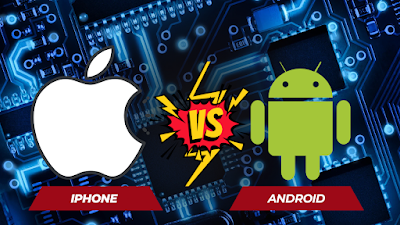IPhone vs Android: Choosing the Perfect Smartphone. In today's fast-paced digital world, smartphones have become an essential part of our lives. They connect us with the world, help us stay organized, and provide entertainment on the go. When it comes to choosing a smartphone, the two most popular options are iPhone and Android. In this article, we will delve into the differences between the two platforms, highlighting their unique features, user experiences, and ultimately helping you make an informed decision.
Design and Build Quality
The design and build quality of a smartphone are important factors to consider. iPhones are known for their sleek and premium design, often featuring a seamless combination of glass and metal. On the other hand, Android devices come in various designs from different manufacturers, providing more options in terms of aesthetics and personal preference.
Operating System
One of the fundamental differences between iPhone and Android is the operating system. iPhones run on iOS, a closed-source operating system developed by Apple. iOS offers a seamless and intuitive user experience, known for its simplicity and consistency across devices. Android, on the other hand, is an open-source operating system developed by Google. It provides a high level of customization and flexibility, allowing users to personalize their devices to a greater extent.
User Interface
The user interface (UI) plays a crucial role in the overall user experience. iOS offers a clean and minimalistic UI, featuring easy-to-navigate menus and a user-friendly layout. Android, on the other hand, provides a more customizable UI, with options for widgets, app drawer customization, and more.
App Ecosystem
The app ecosystem is an important consideration when choosing a smartphone. The Apple App Store boasts a vast selection of high-quality apps optimized for iPhones. It is known for its stringent app review process, ensuring a secure and reliable experience for users. Android, on the other hand, has the Google Play Store, which offers a wide range of apps and allows for greater flexibility in terms of app installation.
Customization Options
If you value customization and personalization, Android offers a plethora of options. From changing themes and icon packs to installing custom launchers, Android allows you to tailor your smartphone experience to your liking. On the other hand, iPhones provide limited customization options, focusing more on a consistent and streamlined user experience.
Camera Performance
Smartphone cameras have become increasingly important in recent years. iPhones are renowned for their exceptional camera performance, offering high-quality images and videos with impressive color accuracy and dynamic range. Android devices, on the other hand, provide a diverse range of camera setups, with some models excelling in low-light photography and others emphasizing versatility with multiple lenses.
Battery Life
Battery life is a critical factor for many smartphone users. iPhones are known for their efficient power management, ensuring longer battery life with optimized hardware and software integration. Android devices offer a wide range of battery capacities, allowing users to choose models that suit their specific needs.
Security
Security is a paramount concern when it comes to smartphones. iPhones are known for their robust security measures, including regular software updates and stringent privacy policies. Apple's closed ecosystem and strict app review process provide an additional layer of protection. Android devices have also made significant strides in terms of security, with frequent updates and built-in security features.
Price Range
Price is often a determining factor when purchasing a smartphone. iPhones tend to be more expensive compared to their Android counterparts. However, Android devices offer a wide range of price options, catering to different budget requirements.
Performance and Speed
Both iPhone and Android devices have made significant advancements in terms of performance and speed. iPhones, with their optimized hardware and software integration, often deliver smooth and lag-free performance. Android devices, powered by various processors and configurations, provide a diverse range of performance options to suit different user needs.
Storage and Expandability
The storage capacity of a smartphone is crucial for storing photos, videos, apps, and other files. iPhones offer fixed storage options with no expandable storage. Android devices, on the other hand, often come with expandable storage options, allowing users to add more storage space through microSD cards.
Accessibility Features
Accessibility features are essential for users with disabilities. Both iPhone and Android offer a range of accessibility features, including voice assistants, color adjustments, hearing aids support, and more. It's important to consider specific accessibility requirements when choosing a smartphone.
Conclusion
Choosing between an iPhone and an Android device ultimately depends on your personal preferences, priorities, and budget. iPhones offer a seamless user experience, a closed ecosystem, and top-notch security. Android devices provide greater customization options, a diverse range of models, and more affordable options. Consider your needs, explore the features and specifications of both platforms, and make an informed decision that aligns with your requirements.
FAQs
1. **Can I transfer my data from an Android device to an iPhone?**
Yes, Apple provides tools and instructions to help you transfer your data, such as contacts, photos, and messages, from an Android device to an iPhone.
2. **Can I use Android apps on an iPhone?**
No, iOS and Android have different app ecosystems. You can only use apps available on the Apple App Store on an iPhone.
3. **Which platform is more popular, iPhone, or Android?**
Android holds a larger market share globally due to the wide variety of manufacturers offering Android devices. However, iPhones enjoy a strong user base and a loyal following.
4. **Are iPhones more secure than Android devices?**
iPhones are known for their robust security measures, including regular software updates and strict privacy policies. However, Android devices have also improved their security features in recent years.


.png)


0 Comments